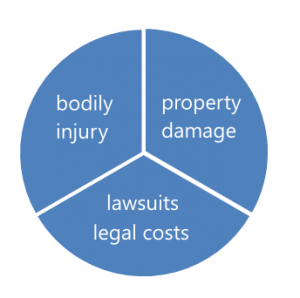General liability insurance protects a company’s assets and pays for obligations. For example, it covers medical costs incurred if someone gets hurt on your property or when there are property damages or injuries caused by you or your employees. Liability insurance also covers the cost of your legal defense and any settlement or award should you be successfully sued. Generally, these include compensatory damages, non-monetary losses suffered by the injured party, and punitive damages. General liability insurance can also protect you against any liability as a tenant if you cause damage to a property that you rent, such as by fire or other covered loss. Finally, it can also cover claims of false or misleading advertising, including libel, slander, and copyright infringement.
Getting liability insurance is a wise investment that doesn’t cost much – annual premiums could range from $425 and up on your line of business and coverage needs. That’s certainly a lot less than the thousands, if not millions, of dollars you may need to spend fighting your case in court. General liability insurance can be purchased on its own, but it can also be included as part of a Business Owner’s Policy (BOP) which bundles liability and property insurance into one policy. If you have a BOP, check it to see what your liability coverage limit is. You may find that it is quite low, in which case you may need additional coverage through a separate policy. There are specific liability products catered to contractors that you can add some tools and equipment coverage making it into a BOP that costs the same if not better than just getting liability coverage by itself. The coverage you need depends on the type of business you are in and the perceived risk associated with it.
How general liability insurance works is the same as many insurance plans, your general liability policy will outline the maximum amount the insurance company will pay against a liability claim. So, if your small business gets sued for $250,000 for medical costs associated with an injury caused by a worksite hazard, plus an additional $100,000 in legal fees, but your coverage maxes out at $300,000, then you are responsible for paying the difference of $50,000. If you are on the higher end of the risk scale and already have general liability insurance, you can also opt for umbrella insurance that increases your coverage limits. This will cover you in situations in which you’re worried that your existing coverage won’t cover all your costs should someone file and win a claim against you. The most commonly asked limit we have found is $1,000,000 per occurrence with a $2,000,000 aggregate.
If an incident occurs that may lead to a claim, you should notify your insurance company or agent immediately. Be prepared to explain what has happened in detail including the time, date, the names of any witnesses, and any other pertinent information.
Remember General Liability Insurance just like all other kinds of insurance are designed to help you in a time of need. Make sure you review your policies with your insurance agent on a regular basis. This can help you make sure you are up to date on coverages and that you have the limits that best suit your business. This is important because your business has probably changed a great deal from the first time you took a policy out when you open your doors.







 Lifting exposures: Generally, are your employees lifting over 50lbs on their own? If so, find a different alternative to lifting like a dolly or something to assist in the lift. That can also be a mechanical hoist or a 2 wheeler to move heavy items. It could also be requiring team lifting for objects over a certain weight. All of these strategies can limit this risk for your business.
Lifting exposures: Generally, are your employees lifting over 50lbs on their own? If so, find a different alternative to lifting like a dolly or something to assist in the lift. That can also be a mechanical hoist or a 2 wheeler to move heavy items. It could also be requiring team lifting for objects over a certain weight. All of these strategies can limit this risk for your business.  Now many business owners have an initial reaction to being offered
Now many business owners have an initial reaction to being offered